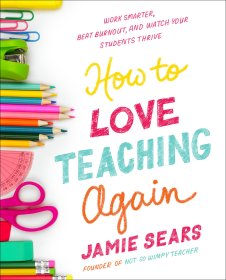
【预订】How to Love Teaching Again
书籍内容简介可联系客服查阅,查书找书开票同样可以联系客服
¥ 128 ¥ 128 九五品
库存2件
作者Jamie Sears
出版社Penguin Publishing Group
ISBN9780593539736
出版时间2023-04
装帧平装
定价128元
货号YB-88842
上书时间2024-06-28
- 最新上架
商品详情
- 品相描述:九五品
- 商品描述
-
商品简介
A heartfelt, hands-on guide to setting boundaries, increasing productivity, and finding fulfillment for teachers who know that their classrooms won’t thrive unless they do.
Over time, teachers internalize myths about their success that cause them to fall out of love with teaching.
“I’ll never be one of the 'perfect' teachers’”
“My self-worth is defined by my students’ test scores”
“The only way to get it all done is to work on weekends”
How to Love Teaching Again kicks these myths to the curb and replaces them with practical tips to defeat burnout, overcome perfectionism, and restore the joy of teaching.
As the CEO of Not So Wimpy Teacher, one of the most popular teaching resource brands on the internet, Jamie Sears has spent years designing tools and inventing strategies that restore the joys of teaching. This book offers simple step-by-step strategies that have helped thousands of teachers around the country transform their relationship with work, including:
- Reinventing small groups and centers so that they’re easier to manage—and so you don’t feel like you’re spread thin
- A foolproof productivity system just for teachers, including a life-saving method for batching lesson plans
- Scripts for establishing boundaries that will drastically reduce the time you spend lesson planning, responding to emails, and planning extracurriculars
这是一本真诚的、实用的指南,帮助教师设定界限、提高生产力和找到成就感,因为他们知道,如果不这样做,他们的课堂就不会蓬勃发展。
随着时间的推移,教师会内化关于他们成功的神话导致他们不再热爱教学。
“我永远不会成为‘完美’教师之一””
“我的自我 -价值是由我的学生定义的考试成绩”
“完成这一切的唯一方法就是周末工作”
如何再次热爱教学打破了这些神话并用实用的技巧来代替它们,以克服倦怠,克服完美主义,恢复教学的乐趣。
作为网络上最受欢迎的教学资源品牌之一Not So Wimpy Teacher的首席执行官杰米·西尔斯花了数年时间设计工具并发明策略,以恢复教学的乐趣。本书提供了简单的分步策略,帮助全国数千名教师改变了他们与工作的关系,包括:
- 重塑小组和中心,使他们更容易管理——这样你就不会觉得自己被分散了
- 专为教师设计的万无一失的生产力系统,包括批处理课程计划的救生方法
- 脚本建立界限,这将大大减少你花在备课、回复电子邮件和规划课外活动上的时间
作者简介
Jamie Sears is a wife, mother of 6 children, a former 3rd grade teacher, and creator of “The Not So Wimpy Teacher”, an education blog that spans across Facebook, Instagram, YouTube, email, and similarly named podcasts. With half a million teachers and administrators in her tribe, she teaches educators how to better help their students and themselves.
精彩内容
Chapter one
The Standards for Being
a Great Teacher
When I was a student teacher, I taught twelfth-grade government. Or so I thought.
W
I had 150 students in total. Every time I gave an exam, one-fourth would fail. As a former lobbyist and always perfectionist, I was dumbfounded. I had given my students solid lessons, great notes, and a super resourceful study guide.
But thirty-seven kids still flunked every unit test I gave. As I made red mark after red mark, I beat myself up about what a terrible student teacher I was and how no school would ever hire me. Yup, I am pretty dramatic. The teacher who was mentoring me at the time-one of my favorite teachers from high school-told me to be patient with myself. He didn't seem worried in the least. And you know what? Every single one of those 150 students passed the course and graduated. Despite failing my unit tests. Many went to college and I hope all of them learned enough in my class to understand the importance of voting. (Please vote.)
But what I learned through that experience is that my classroom-and yours-isn't the last place your students will learn. About math, English, social studies, government, and life. Our educational journey is long. There are tough times for every student along the way. What I want you to realize and remember is that your classroom is not the final destination. You are just one stop on every student's educational journey. The kids in your class get to make other stops along the way. Each stop-from first grade to sixth grade to twelfth grade and beyond-is another opportunity for a new adventure and lessons learned.
So-deep breath here-it is perfectly okay if every student does not meet and exceed each testing standard while in your classroom. Yup, I said it. Every kid isn't the same. An entire class of kids can't all learn and grow at the same pace, and therefore, every student won't end at the same place at the end of this school year. Those who wrote the standards might not know this, but you and I are smart cookies. We know with certainty that every kid in our classroom, regardless of current grade-or reading!-level, will have a different experience with their education.
We're taught that students' overall education is the goal when we learn to teach, but in practice it's easy to forget and lose perspective. It can be so tempting to base our self-worth as teachers on student test scores. A few kids don't pass their math-facts test and suddenly you are spiraling in despair about what a terrible teacher you are.
If you are doing this right now, take a breath. You are not alone. I did it too. Teachers face so much pressure for their students to perform on tests when, really, standardized testing is just one data point and can be irrelevant to the quality of teaching that is actually happening in the classroom.
You love your students. You want them to succeed. But their success is not the definition of being a great teacher. Think back to your favorite teacher from school. Did you like them because you always got As on their tests? I doubt that's the reason you still fondly think of them as a great teacher. Instead, I bet you loved that teacher because of how they made you feel, how they spoke to you, what they believed or noticed about you that others didn't.
My mentor teacher when I was student teaching was actually my government teacher in high school. Mr. Craig was one of my all-time favorite teachers because he talked to me like I was brilliant. He treated me like an adult and believed I was capable of succeeding at hard things. That's why my definition of a great teacher is listening to, believing in, and pushing your students. It's not about having the best test scores in your district.
I wanted to be a great teacher. I knew that from the moment I made it Facebook official that I was going back to school to become a teacher. However, even though I knew in my heart that I could be a great teacher, I had my doubts. I kept hearing my cousin's words in my head. "You can't be a great teacher and a great mom. You'll suck at one of them." I just had to prove her wrong, even if I didn't know quite how to make it happen.
When teachers in the Not So Wimpy Teacher Facebook groups post about feeling like bad teachers, it reminds me of marshmallows. That seems weird, right? But I promise-it'll make sense after I share a story. Before I got married, my mom threw me a bridal shower and invited lots of her friends. None of my friends came because we were all broke college students at the time, and it was hard enough for us to scrounge up gas money, much less gravy boats and china. Driving to my mom's house on the day of the shower, I felt grateful for the generosity of my mom and her friends, and excited for the actual party. And it was fabulous. Except for the games.
There was one game in particular I will never forget. Prior to my bridal shower, my mom asked Scott some questions about himself. Then, at the bridal shower, she asked me the same questions. If I got the question right, we went on to the next question. But if I got it wrong, I had to put a giant marshmallow in my mouth. I wasn't allowed to chew it or swallow it. I just had to keep it in my mouth until the end of the game.
My mom started asking questions, and it became apparent very quickly that I had been set up. To this day I don't know if it was my mom, or Scott, or if they were in on it together . . . but I got every question wrong. Even the ones I knew for sure-like what size shoes Scott wore. I mean, I bought his shoes! I was sure I had the right answer. But another marshmallow was added to my mouth.
It went on and on like this. I knew all the answers. But every answer Scott had given was inaccurate. It didn't matter, though, because according to the rules of the game I had to keep adding marshmallows to my mouth while all her friends laughed hysterically. I ended up with a mouth full of massive marshmallows. It was awful. And it was hard for me to breathe. By the end of the game, I was gagging and couldn't even answer the questions because of the marshmallows.
To this day I can't even think about marshmallows without feeling nauseated.
Teaching is a lot like having a mouth full of marshmallows. When you first graduate from college, you have just one marshmallow. It's sweet and delicious. You love it so much. You are so excited about your career path and spend lots of time dreaming about the lives you will impact in your super-fun, totally cute classroom.
Then you get your first job and another marshmallow is added. You're excited, but also nervous. You have so many decisions to make. What should you buy? How should you set up your classroom? Should you have themes? Next, there are professional development and
相关推荐
-

【预订】How to Be Weird
九五品成都
¥ 118.00
-

【预订】How to Be Weird
九五品济南
¥ 118.00
-

【预订】How to Be Weird
九五品广州
¥ 118.00
-

【预订】How to Be Weird
九五品广州
¥ 118.00
-

【预订】How to Be Weird
九五品广州
¥ 118.00
-

【预订】How to Know a Person
九五品成都
¥ 218.00
-

【预订】How to Love Teaching Again
九五品成都
¥ 128.00
-

【预订】How to Love Teaching Again
九五品广州
¥ 128.00
-

【预订】How to Love Teaching Again
九五品广州
¥ 128.00
-

【预订】How to Love Teaching Again
九五品广州
¥ 128.00
— 没有更多了 —












以下为对购买帮助不大的评价